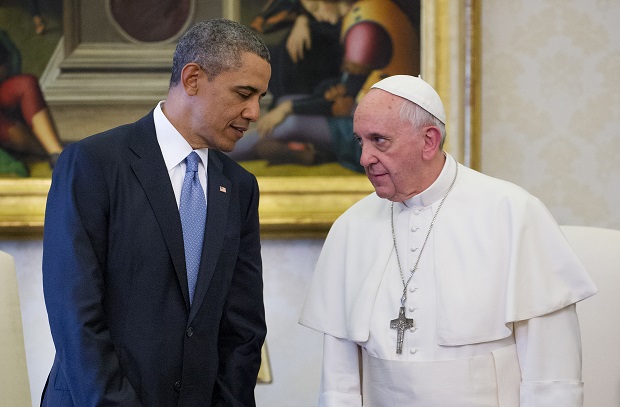
In this photo taken March 27, 2014, President Barack Obama meets with Pope Francis at the Vatican. Pope Francis highly anticipated visit to the White House will put on display his common cause with President Barack Obama on many issues. When he swept into office in 2008, Obama captured near rock-star status among millions who saw him as the embodiment of a new sense of social purpose. Now, that baton has largely passed to the outspoken Francis. AP Photo
WASHINGTON, United States—Americans are eagerly awaiting a visit from Pope Francis but can expect an earful in this land of plenty from the reform-minded pontiff with calls to help migrants and fight poverty and global warming.
READ: Pope Francis prepares for most political trip yet
The 78-year-old leader of the Roman Catholic church will come to Washington September 22 after a stop in Cuba, and also visit New York and Philadelphia through the 27th.
Francis is known and praised for his focus on compassion for the poor and downtrodden—and hands-on mingling with them—and his denunciations of creature comforts and zeal for wealth as contemporary society’s main sources of happiness and meaning in life.
READ: Obama to seek unity with pope on issues in White House visit
And here he comes, to the country synonymous with bustling, go-go capitalism and a drive for material success at all costs.
“Christians should comfort the afflicted and afflict the comfortable, so I think he is going to shake up Americans of all sorts,” said Father James Martin, a Jesuit who is the editor in chief at America, a Catholic journal.
Francis will address Congress September 24 in a keenly awaited speech, as “there are issues that make it difficult for Americans to understand Francis,” said Massimo Faggioli, a Catholic church historian and theology professor at the University of St. Thomas in St. Paul, Minnesota.
In an encyclical published in June, Francis said global warming was caused by mankind, with greed and consumerism. He said rich countries must bear the responsibility and pay for a solution.
“It is a very powerful accusation against a certain economic system that is the American way,” Faggioli said.
Some Americans, especially ones skeptical of global warming, took offense at the appeal.
“I don’t go to mass for economic policy or for things in politics,” Republican presidential hopeful Jeb Bush said at the time.
Even among US Catholics, only 29 percent feel that fighting climate change is an essential part of their religious identity, according to a recent poll by the Pew Research Center.
During a visit to poverty-stricken Bolivia in July, the pope said, “Once capital becomes an idol and guides people’s decisions, once greed for money presides over the entire socioeconomic system, it ruins society.”
And in the US these days income inequality—the gaping canyon between the rich and poor—has become a scandal.
Martin said the pope’s remarks “have been seen as a condemnation and many capitalists in the US cannot hear it.”
On migration, one of the top issues in the US presidential race, Francis could clash with Republicans opposed to reforms aimed at granting legal status to people who are in the United States illegally or with ones who “tend to get closer” to Donald Trump, Faggioli said.
Trump, the billionaire leading the field, has said he wants to build a wall along the border with Mexico and said that country sends rapists and other criminals into the United States.
‘Cultural war’
But the Catholic church in America, half of whose flock are Latinos, will be in sync with the Pope, who has long been active on the issue of treating migrants more humanely.
But Faggioli said the church has a harder time stomaching recent action by the pope on moral issues.
Specifically, he has ordered a major speeding up—and cheapening—of the long and costly procedure for divorced Catholics to obtain an annulment of their failed marriage and thus be able to remarry in the church.
“They think that pope Francis doesn’t know what he is doing,” the professor said.
“They think he is reversing completely the policies of US Catholic bishops in these last thirty years more or less,” Faggioli said.
During that span, he added, the Catholic church was in a cultural war against liberal modernity in the US.
But the pope “doesn’t believe in cultural war. He believes in dialogue, in being attractive for the church,” Faggioli said.
“Pope Francis is no knee-jerk liberal,” Paul Vallely, author of a recent biography of the pope, wrote in the newspaper Politico.
Surprise in store?
“He has held the traditional Catholic line on issues like abortion, gay marriage and even contraception, yet he has radically shifted the focus of the Catholic Church away from sexual ethics onto the morality of money,” Vallely wrote.
American Catholics want a more flexible approach from the Vatican on artificial contraception, letting divorced Catholics remarry and same sex couples, according to the Pew poll.
They are also comfortable with alternative family arrangements: 66 percent said it is acceptable for a gay or lesbian couple to raise children. This will be a key focus of the Pope’s visit to Philadelphia for a forum on the Catholic family.
The pope will be more cautious than he was during visits to Latin America or in Italy, Faggioli predicted.
But he might also surprise people.
“He has potential to be a lot more disturbing than either John Paul II or Benedict XVI because he tends to the unexpected,” said Martin.